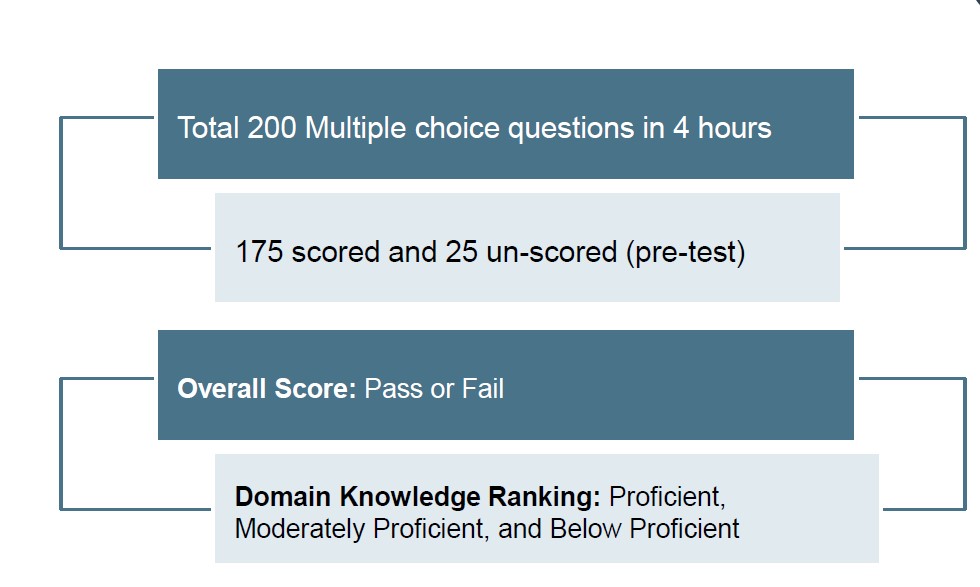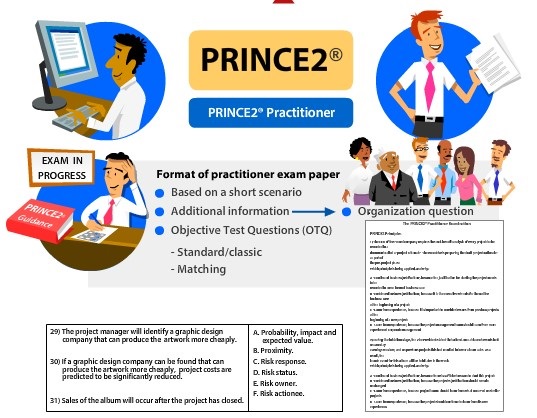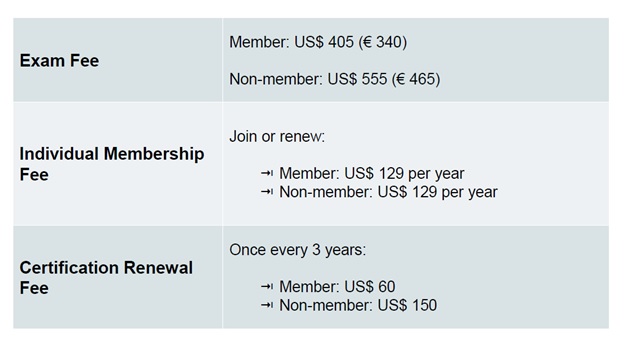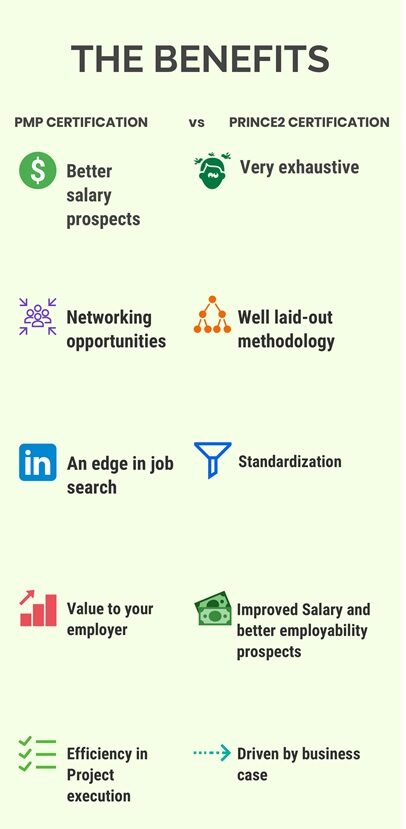
The War of Certifications
If you’re in the Project Management field, or if you want to indulge and immerse yourself in this thriving discipline, you would have wondered what steps you need to take to kick-start your career with a certification recognized around the world. Both the Project Management Professional (PMP®) and PRINCE2 (Projects In a Controlled Environment) are highly reputed in the field. These certifications can be used by the employers to assess your understanding on Project Management concepts and how to apply them throughout the project management life-cycle.
Therefore, this invites a question in your mind of which certification is right for you. It is not an easy decision, don’t you worry. We at PMOBytes® have done the hard work in analyzing and collecting data for you. This article will give an overview of both the certifications, job prospects, benefits and trends for each one. Read on to make the choice on your climbing the corporate ladder.
The Project Management Professional (PMP) ® Certification
One of the highly reputed certifications in the world of Project Managers, the Project Management Professional® (PMP) Certification is an internationally recognized professional designation offered by Project Management Institute (PMI)®. Various industry’s individuals accredit PMP as a standard requirement for project managers. Becoming a PMP empowers you to work with any methodology and in any industry. The certification course covers a wide spectrum of project management techniques and competencies that are necessary for any project manager and can help increase your earning potential. This course, administered by PMI in the USA, has also gained popularity in Europe, Africa and Asia.
The PMP qualification:
- Is indicative of your proficiency in using the PMBOK® Guide, the Project Management Book of Knowledge
- Verifies your knowledge of “generally-accepted” best practices and principles of project management.
- Is more generic covering knowledge areas enabling you to understand the project management tools and techniques and applying them in the complete project life cycle.
Projects In Controlled Environment (PRINCE2®) Certification
The PRINCE2®, or ‘Projects In Controlled Environment’ certification, is a process-based project management method that offers a systematic approach to delivering a successful project with clear templates, processes, and steps. The certification is both process and project-focused. PRINCE2 is administered in the UK by AXELOS® and by PeopleCert® for examinations.
The PRINCE2 qualification:
- Is an extensive framework that consists of project management principles, themes and processes, which means it is recommended for and can be implemented on just about any project within any industry.
- Has a well-laid out and standardized approach to project management.
- Spells out the roles and responsibilities of each member of the team tasked with managing the project.
- Divides the master project plan into project plans, stage plans, and team plans, which eliminates ambiguity and makes it easier to execute the project.
- It is both project and process focused.
Industry Demand
If you wish to get your certification, it is also important for you to do your research to pick the right certification for you. Both the certifications have demands in specific geographies, so you need to determine which country you should work in to boost your employment opportunities.
PMP is more recognized in USA, Canada, Africa, Middle East and Australia. While, PRINCE2 is recognized in UK, Europe, Middle east and Australia.
Salary Prospects
Several studies and surveys show that certified professionals in project management earn much more than their non-certified peers. Having a project management certification, especially ones like PRINCE2 and PMP, signifies that an individual knows and understands the universal terminologies used in the field of professional project management within organizations.
The Project Management Institute’s (PMI) ‘Earning Power: Project Management Salary Survey” states that the salaries of project managers around the world continue to climb.
In the US alone, the average annual salary of a certified PMP is $108,200 per year. The majority of the survey respondents (82%) earn an average of 23% more than their non-certified peers in an average across 37 countries. The countries where project management professionals report the highest median salaries are Switzerland
(US$130,996), the United States (US$112,000), and Australia (US$108,593), whereas the country with the lowest median salary is Egypt (US$10,159).
| Annualized Salary (in U.S Dollars) by Country | ||
| Country | n= | Median salary exchange rate |
| Switzerland
United States Australia Germany Netherlands United Arab Emirates New Zealand Qatar United Kingdom Belgium Ireland Hong Kong Sweden Canada South Africa Singapore Saudi Arabia Japan France South Korea Italy Chile Spain Brazil Poland Costa Rica Peru Ecuador Mexico Turkey Colombia Taiwan Malaysia China India Nigeria Egypt |
549
10,937 955 992 404 523 491 316 759 314 557 231 480 2,932 658 665 414 699 721 267 1071 208 1,238 878 457 191 328 186 568 355 464 241 440 758 1480 239 178 |
$130,966
$112,000 $108,593 $88,449 $86,292 $84,930 $84,480 $82,314 $81,227 $78,035 $75,506 $74,160 $73,769 $73,495 $71,802 $67,875 $63,979 $62,930 $62,562 $62,300 $53,933 $51,340 $48,539 $45,114 $40,117 $38,640 $36,244 $35,000 $34,904 $33,130 $30,600 $30,298 $30,015 $29,040 $25,959 $21,498 $10,159 |
More than two-thirds of survey participants (70%) report that their total compensation (including salary, bonus, and other forms of compensation) increased over the 12 months prior to completing the salary survey. About one-quarter (26%) reported increases of at least 5% over that time period.
According to payscale.com, the average salary for professionals with a PRINCE2 certification is $97,000.
Salary by Industry:
According to a PMI® survey, the highest salary a PMP® can earn is in the resources industry or the primary sector (agriculture, mining, etc.), at $127,000.
Benefits of getting the PMP® certification include:
- Better Salary Prospects: Certified PMP professionals get more significant and more frequent pay raises than their non-certified peers.
- Networking Opportunities: To obtain a PMP certification, it is recommended that you become a member of PMI. Once you are a member, you have access to a vast network of professionals with similar qualifications. These contacts can prove crucial in helping you land a project management job.
- Better Employment Prospects: As the world’s most popular project management certification, the PMP credential is recognized and trusted by employers worldwide.
Benefits of getting the PRINCE2 certification include:
- Exhaustive Body of Knowledge: The PRINCE2 body of knowledge equips credential-holders with the tools to analyze a project from all angles, ensuring its viability before it is initiated. Factors like user requirements and potential risks are taken into consideration, ensuring that a project that is bound to encounter hurdles is addressed in the planning stages.
- Well Laid-out Methodology: A lot of time and resources are saved during the completion of a unique project since the certification has a clearly laid out methodology.
- Standardization: Confusion in project execution is eliminated since the same, standard approach is used throughout, with conventional filing systems, procedures, and documents.
- Improved Salary and Better Employability Prospects: There is a higher chance of landing a better job that pays well in countries like the United Kingdom. Your employer is provided with enough justification for your skills to give you a pay raise.
- Driven by Business Case: PRINCE2 requires users to self-assess and provide updates on business cases at defined points to ensure that a project will deliver value to the organization and its customers. Failure to do so will eliminate the justification for the continuity of the project.
The Exams
PMP Exam Format
With a total of 200 questions, the PMP exam lasts four hours and is split into the process group areas of Project Initiation, Project Planning, Project Execution, Monitoring and Controlling, and Project Closing. Out of the 200, 175 questions are scored but you cannot identify the unscored ones, so all the questions need to be attempted.
Within these five larger domains are a multitude of other 10 knowledge areas like integration management, risk management, scope management, cost management, schedule management, resource management, quality management, change management, procurement management, and stakeholder management.

PRINCE2 Exam Format
The PRINCE2 Foundation exam tests the individual with 60 multiple-choice questions for 60 minutes. 55% or higher is passing and the questions are objective based with four options to select the appropriate answers. There is no negative marking in these exams and it’s a closed book exam administered by PeopleCert and its partners.

The Practitioner exam is an objective, scenario-based paper, there is even an additional information sheet provided which needs to refer as required to reply the answers. The individual is tested based on 68 standard and matching format questions.
These are provided with a time limit of 2.5 hours. Each question carries one mark, you must score 38 right answers to reach to a pass level i.e. 55% pass score required. PRINCE2 Practitioner is an open book exam in which you can carry the PRINCE2 official manual for your necessary reference during the exams.

Prerequisites
There is a set of prerequisites that one will need to meet to take up the PMP exam.
Secondary degree (high school diploma, associate’s degree or the global equivalent)
- 7,500 hours leading and directing projects
- 35 hours of project management education
OR
- A four-year degree
- 4,500 hours leading and directing projects
- 35 hours of project management education

There are no defined prerequisites for the PRINCE2 exams. However, it is recommended that you have some project management experience and formal training before you take the exam. The Practitioner exam will require you to have passed the Foundation exam.
The Exam Cost
The cost of the PMP® exam – though a little expensive – is well worth the investment. For members of the PMI®, it is $405, while for non-members it is $555.

The cost of the PRINCE2 to exam varies according to the region you are taking the exam in. On average the exam fees are $250 – $300 for Foundation and for practitioner around $300 – $400. Training ranges at different costing depending on the quality and accreditation of the training providers possess for their organization.
Maintaining your Credential
To maintain the PMP certification, you will need to attain 60 PDUs or Professional Development Units every three years.
Your PRINCE2® Practitioner certificate is valid for three years, at the end of which you will need to either re-appear the Practitioner exam or maintain your certificate through a subscription to My PRINCE2.
To remain current through My PRINCE2 you must meet the following criteria within the three-year period:
- Join My PRINCE2 within three months of passing your exam and remain subscribed for the three-year period by renewing the subscription each year.
- Maintain your PRINCE2 digital badge which will be awarded as part of My PRINCE2 for the three-year period. You will need to record 20 CPD (Continuing Professional Development) points each year, in the prescribed categories, for the badge to be extended on renewal.
By satisfying the above criteria you will be issued a new certificate that is valid for a further three years.
| PMP | PRINCE 2 Foundation | PRINCE 2 Practitioner | |
| Subject | PM Knowledge | PM Method | |
| Deals with the question type | How? | What? When? Whom? | |
| Most Common in | USA, Canada, Middle East, Australia | UK, Europe, Australia | |
| Source of the Exam | Mainly PMBOK Guide, but not limited to it | The official manual, Managing Successful Projects with PRINCE 2 | |
| Number of Questions | 200 | 60 | 68 |
| Type of questions | Multiple choice | Multiple choice | Objective Testing |
| Pass Mark | 61% | 55% | 55% |
| Duration | 4 Hours | 60 Minutes | 150 Minutes |
| Open Book? | Closed book | Open book
Note: Only the official printed hard copy of the Managing Successful Projects with PRINCE2 2017 Edition is allowed. |
|
| Pre Requisites | At least 3 years of experience (4500 Hours) in the field of Project management along with a bachelors degree. | Being certified as PRINCE 2 Foundation | |
| At least 5 years of experience (7500 Hours) in the field of Project management along with a Diploma degree. | No formal training hours are required. Self-study can also be done. | No formal training hours are required. Self-study can also be done. | |
| 35 Hours of Formal Project Management training. | |||
| Registering for the exam. | By registering at pmi.org, and taking the exam in Prometric exam centers around the world. | Usually by registering at an accelerated training organization and taking the exam online at the exam center, or any other place you have arranged with your training organization. | |
| Renewing the certificate | Every 3 years with 60 PDU’s. | It has no expiry date. | Retake the PRINCE2 2017 Practitioner exam before 3 years or maintain the certificate through CPD Points |
| Exam cost | For PMI Members: $405
For Non PMI Members: $555 |
Varies according to the region the exam is taken in. |
Is it advisable to do both?
Many people view the PRINCE2 and PMP certifications as different, which is why there is a battle between the two certifications.
The PMP is related to the knowledge and skills necessary to successfully manage a project and its delivery.
PRINCE2 is focused mainly on the processes and the framework to execute specific types of projects in controlled environments successfully.
Therefore, it is advisable that you do both certifications as it helps in the development of the professional’s excellent project management skills.
There may be a few drawbacks to this-
- Conflicting language: The two courses use different terminologies, which can be confusing at first. For example, project charter in PMP is what is known as project mandate in PRINCE2.
- Different Techniques: Some techniques differ vastly, such as the categorization of risk.
Conclusion
The certification you choose should depend on your job prospects and the region you are working in. PMP and PRINCE2 are not competing but are complementing an individual with different credentials and regional recognition. A professional would benefit from the skills and knowledge that both certifications offer.



